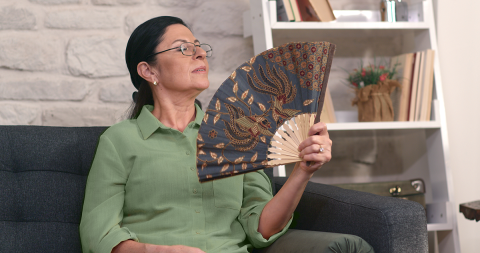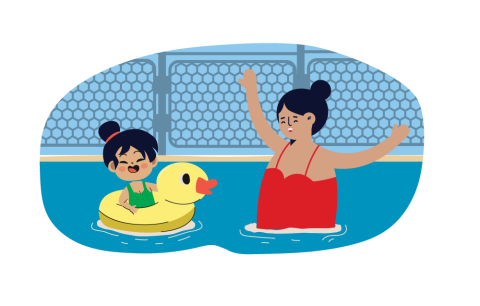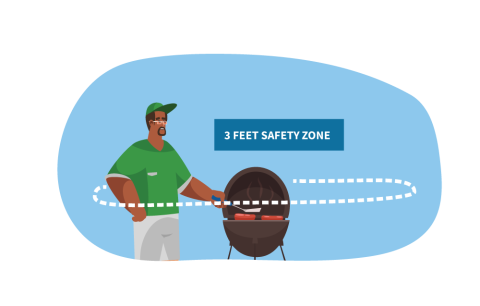Take Simple Steps
Summer Safety Tips
Additional Resources
Climate models predict that extreme heat will become more frequent and intense as climate change continues. #SummerReady aims to reach vulnerable populations and boost awareness of the impacts of extreme heat and the simple steps to prepare.
Extreme heat can be especially dangerous to groups of people across communities, including:
- Lower income households
- Rural communities
- Residents in urban heat islands
- Infants and children
- Older adults
- Laborers
- Individuals with medical conditions
- Athletes
Ready Campaign’s first ever #SummerReady public education effort is designed to reach all communities with simple, accessible and culturally competent messaging on extreme heat all summer long.

Check out Heat.gov to learn more about what communities can do to be prepared for extreme heat, and the funding resources available.
Take Simple Steps
Being #SummerReady means understanding your risk of extreme heat and taking steps now to prepare.
Tips for Everyone
- Learn the signs of heat-related illnesses and ways to respond from the CDC.
- Fans alone aren’t enough in high heat + high humidity. Get inside in air conditioning or go to a public place like the library, museum, or shopping mall to beat the heat.
- NEVER leave children or pets alone in hot vehicles! Heat can rise in a car, up to 20 degrees in just 10 minutes.
- During extreme heat, check on family, friends, and neighbors who do not have air conditioning and who spend much of their time alone.
- Roughly 40% of unwanted heat buildup in our homes is through windows. Use awnings or curtains to keep the heat out.
- Use your oven less during extreme heat advisories and warnings so you don’t make your house hotter.
Tips for Your Specific Needs
Some people have situations that need a little more attention. Find unique tips below for what you need.
"I need ideas that don't cost a lot of money."

- Identify places in your community where you can go to get cool such as libraries and shopping malls or contact your local health department to find cooling options in your area.
- Check the weather stripping on doors and windows to keep the cool air in.
- Have multiple ways to move air and reduce the temperature in your home. Fans create a sense of comfort, but may not be enough to reduce body temperature or prevent heat-related illnesses.
- If you are unable to afford your cooling costs, weatherization or energy-related home repairs, contact the Low Income Home Energy Assistance Program (LIHEAP) for help.
"I am an older adult."

- Do not stay home alone during a summer power outage or an extreme heat event.
- Make sure a trusted friend or relative has an extra key to your home, knows where you keep your emergency supplies and can use lifesaving equipment or administer medicine.
- Drink fluids regularly to avoid getting dehydrated and overheated. Talk to your doctor about whether you need fluids with extra electrolytes in the heat.
- Be careful with the amount of time you spend outdoors. Take frequent breaks to come back inside, cool off, and drink fluids that don’t have caffeine.
"I work outside."

- Make sure you drink LOTS of water to stay hydrated and prevent dehydration, heat stroke & more.
- Use cloths or even a T-shirt from the freezer to wear around your neck during extreme heat advisories or warnings.
- Take frequent breaks to hydrate and cool down.
- Wear a hat wide enough to protect your face.
"I have a health condition that makes the heat really hard on my body."

- Work with your support network if you have one - caregivers, neighbors, family and friends - to monitor and address your heat-related needs. Have them check in with you regularly to ensure you are safe and healthy.
- Read the side effects of medications and talk with your doctor about how heat exposure will interact with them.
- Keep a cooler and cold packs nearby to help keep refrigerated medicine, like insulin, cool during a power outage.
- Know the phone numbers and locations for local medical facilities, such as hospitals or nursing homes, to create contingency plans if you cannot access cooling options, lose power, or need more help.
- For more tips, go to Ready.gov/disability.
"I live somewhere that makes the heat seem worse."

- Have an emergency plan that includes the location of cooling shelters and other possible locations with air-conditioning, such as an air-conditioned home of someone from your support network. Plan ahead to coordinate accessible transportation to/from one of these locations.
- If you don’t have air conditioning but have access to a freezer, place cloths and light items of clothing in there to freeze and then wear them during heat advisories and warnings.
- Try to stay in shaded areas if you must be outside.
- Carry water and other liquids with you if you plan to be away from home for a while and will be outside or on public transportation.
Summer Safety Tips
Summer months are a common time to spend time outdoors or to take vacations and travel. While these activities can be a fun and refreshing break from day-to-day responsibilities, it’s important to stay safe.
Outdoor Recreation Safety
Before heading out for an outdoor adventure in a park, on lakes, rivers and the beach make sure you do some research ahead of time. This is especially important if you’re visiting an area with different weather or climate risks you may not be used to.
The National Park Service Health and Safety webpage has information about planning a fun and safe adventure and information about wildlife and outdoor hazards.
Pool and Water Safety for Children:

Being around water can be especially dangerous for young children. Children can drown in as little as 2 inches of water. Drownings are 100% preventable by following these water safety tips:
- Always watch children in or near water. Never leave them unattended, not even for short periods of time.
- Install safety devices like barriers, covers and alarms around your pool or spa.
- Learn to swim and teach children how to swim.
- Ensure all pools and spas have compliant drain covers and teach children to stay away from them.
Water Safety for Everyone:
- Swim with a friend. Even strong swimmers should make sure they are in the water with someone else who can swim.
- Know how to perform CPR on children and adults.
- At the beach or in a lake, only swim in areas with a lifeguard on duty. Follow all signs and warnings.
- Stay alert to rip currents. Check water conditions before going in by looking at the local beach forecast before you leave. Visit the National Weather Service Before You Go in the Water page to learn more about what to do if you’re caught in a rip current.
- Keep an eye on the weather forecast. If a thunderstorm approaches when you are swimming or near water, get out of the water and seek shelter in a house, large building or car with its windows closed.
- Know how deep the water is. Do not dive into the water if you don’t know how deep it is. Diving into shallow water can cause serious injury or death. Even strong swimmers should be aware when they are in deep water.
Boat owners and passenger safety

- Wear a life jacket. The best life jacket is the one you will wear. Visit the U.S. Coast Guard life jacket web page to learn how to pick the right life jacket.
- If you are on a boat of any size, make sure you pay attention to marine forecasts. Before setting out, get the latest marine forecast and warning information from www.weather.gov/marine or a NOAA Weather Radio.
- Stay safe on the water. Visit the U.S. Coast Guard Boating safety page to learn more ways to stay safe when underway and learn federal requirements for recreational boats.
Hotel and short-term rental safety
Whether you are staying in a hotel or a short-term rental, remember to stay fire safe.
- Choose hotels and motels that have hard-wired smoke alarms and an automatic fire sprinkler system in each guest room.
- Read the fire evacuation plan carefully.
- Find the closest fire exits from your room and count the number of doors between your room and the exits.
It’s important to know that short term rentals are not regulated like hotels or motels. Practice home safety like you do at home. Be sure:
- Everyone knows the address of the rental.
- There are working smoke alarms in every sleeping room, outside each separate sleeping area and on every level of the rental.
- You choose an outside meeting place a safe distance from the rental.
Grilling Safety

- Only use a grill outside and keep a 3-foot safety zone around it, away from siding, deck rains and eaves. Open your gas grill before lighting it.
- Clean your grill after each use.
- If using a charcoal grill, after cooking your food place the coals and ash in a metal can with a lid once they have cooled.
Additional Resources
- CDC Resources on Extreme Heat
- National Integrated Heat Health Information System’s Heat.gov
- #SummerReady Extreme Heat Summit Resources
- Biden-Harris Administration Fact Sheet on Investments to Build Community Resilience


